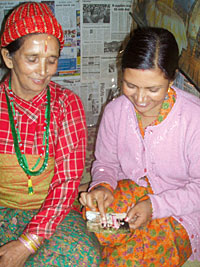 GOPAL GARTOULA FAMILIES, INTERRUPTED Bhutani refugees in Jhapa substitute photos for family |
Here in Beldangi there are tearful scenes of farewell every day as fleets of white IOM (International Organization for Migration) buses taking Bhutanis for third country resettlement leave for Bhadrapur airport.
Among those seeing off relatives and friends are those who have travelled clandestinely from Bhutan for poignant farewells before time and distance separate them from their relatives.
Antari is 35 years old, and has come all the way from southern Bhutan, crossing two international borders, to say goodbye to her parents, and seven brothers and sisters and their children. She is the only member of her family still in Bhutan. "I don't know when I will see them again, they are going so far away," Antari sobbed, clutching a faded photograph of the family taken while they were still in Bhutan. Antari's elderly parents Krishna Prasad and Dhanmaya can't hide their tears.
Hugging her parents, Antari tells them there is now no sign of their little ancestral home in Bhutan and even the tulasi plant in front of their house is gone. But Antari has brought a handful of soil from their homeland to give to her parents in a little plastic pouch before they leave. Dhanmaya takes a pinch from the pouch and puts it on her daughter's forehead like tika as a final farewell.
Like most Bhutanis here, Antari doesn't want to be named or her picture taken for fear of retribution back home in Bhutan. She says the repression of Nepali speakers continues. More than 80,000 Lhotsampa Nepali speakers were not allowed to vote in last year's elections. The signals of some Nepali FM stations reach southern Bhutan, but Antari says one has to be careful not to listen openly for fear of spies in the neighbourhood who have already labeled her 'ngolop' (anti-national) for having refugee relatives in Nepal.
Saraswati Sharma is 83, but has travelled for three days to get to Beldangi to say goodbye to her second daughter, Shibamaya, who will soon be leaving to join her elder sister in the United States. For others, like 45-year-old Bhim, there was a different kind of farewell. Hearing his father was ill, he rushed to Nepal, arriving at the Sanishchare refugee camp only to hear that his father, whom he hadn't seen for ten years, had just died. Bhim went straight to the banks of the river to light his father's funeral pyre.
(Some names have been changed.)
READ ALSO:
Euro Bhutanis - FROM ISSUE #480 (11 DEC 2009 - 17 DEC 2009)
Can't wait to leave - FROM ISSUE #409 (18 JULY 2008 - 24 JULY 2008)
No place like home - FROM ISSUE #306 (14 JULY 2006 - 20 JULY 2006)
Home away from home - FROM ISSUE #340 (16 MARCH 2007 - 22 MARCH 2007)
Long way from home - FROM ISSUE #353 (15 JUNE 2007 - 21 JUNE 2007)


